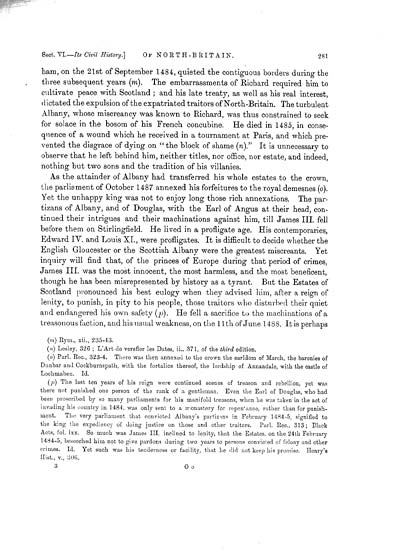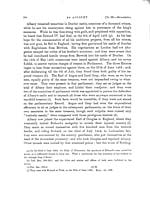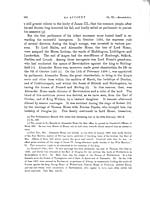Volume 3
(293) Page 281
Download files
Individual page:
Thumbnail gallery: Grid view | List view

281 ham, on the 21st of September 1484, quieted the contiguous borders during the three subsequent years (m). The embarrassments of Richard required him to cultivate peace with Scotland ; and his late treaty, as well as his real interest, dictated the expulsion of the expatriated traitors of North-Britain. The turbulent Albany, whose miscreancy was known to Richard, was thus constrained to seek for solace in the bosom of his French concubine. He died in 1485, in conse- quence of a wound which he received in a tournament at Paris, and which pre- vented the disgrace of dying on "the block of shame (n)." It is unnecessary to observe that he left behind him, neither titles, nor office, nor estate, and indeed, nothing but two sons and the tradition of bis villanies. As the attainder of Albany had transferred his whole estates to the crown, the parliament of October 1487 annexed his forfeitures to the royal demesnes (o). Yet the unhappy king was not to enjoy long those rich annexations. The par- tizans of Albany, and of Douglas, with the Earl of Angus at their head, con- tinued their intrigues and their machinations against him, till James III. fell before them on Stirlingfield. He lived in a profligate age. His contemporaries, Edward IV. and Louis XL, were profligates. It is difficult to decide whether the English Gloucester or the Scottish Albany were the greatest miscreants. Yet inquiry will find that, of the princes of Europe during that period of crimes, James III. was the most innocent, the most harmless, and the most beneficent, though he has been misrepresented by history as a tyrant. But the Estates of Scotland pronounced his best eulogy when they advised him, after a reign of lenity, to punish, in pity to his people, those traitors who disturbed their quiet and endangered his own safety (p). He fell a sacrifice to the machinations of a treasonous faction, and his usual weakness, on the 11th of June 1488. It is perhaps (m) Rym., xii., 235-48. (n) Lesley, 326 ; L'Art de verefier les Dates, ii., 371, of the third edition. (o) Parl. Rec., 323-4. There was then annexed to the crown the earldom of March, the baronies of Dunbar and Cockburnspath, with the fortalice thereof, the lordship of Annandale, with the castle of Lochmaben. Id. (p) The last ten years of his reign were continued scenes of treason and rebellion, yet was there not punished one person of the rank of a gentleman. Even the Earl of Douglas, who had been proscribed by so many parliaments for his manifold treasons, when he was taken in the act of invading his country in 1484, was only sent to a monastery for repentance, rather than for punish- ment. The very parliament that convicted Albany's partizans in February 1484-5, signified to the king the expediency of doing justice on those and other traitors. Parl. Rec., 313; Black Acts, fol. lxx. So much was James III, inclined to lenity, that the Estates, on the 24th February 1484-5, beseeched him not to give pardons during two years to persons convicted of felony and other crimes. Id. Yet such was his tenderness or facility, that he did not keep his promise. Henry's Hist., v., 306. 3 0 o
Set display mode to:
![]() Universal Viewer |
Universal Viewer | ![]() Mirador |
Large image | Transcription
Mirador |
Large image | Transcription
Images and transcriptions on this page, including medium image downloads, may be used under the Creative Commons Attribution 4.0 International Licence unless otherwise stated. ![]()
| Caledonia, or, An account, historical and topographic of North Britain from the most ancient to the present times > Volume 3 > (293) Page 281 |
|---|
| Permanent URL | https://digital.nls.uk/74528660 |
|---|---|
| Description | Vol. III. |
|---|---|
| Attribution and copyright: |
|

